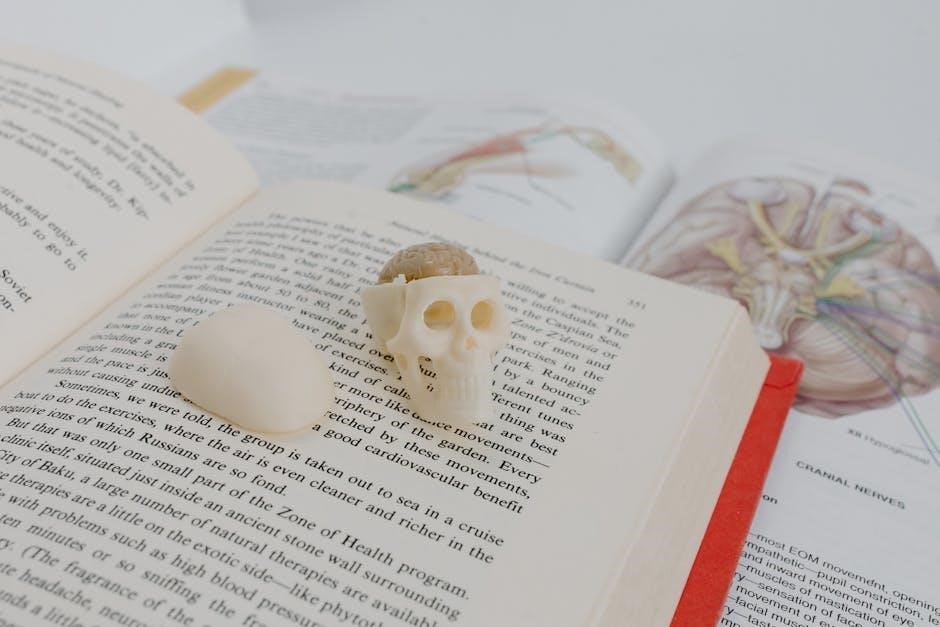This comprehensive study guide provides an essential resource for nursing students, offering review questions, exercises, and a structured approach to mastering nursing fundamentals․ It aligns with nursing curricula and exam preparation, ensuring a strong foundation for future practice․
Overview of the Study Guide
The study guide for fundamentals of nursing is a comprehensive resource designed to support nursing students in mastering essential concepts and skills․ It provides a systematic approach to learning, with review questions, exercises, and practical tools to reinforce understanding․ The guide covers key topics such as health, wellness, and illness, the nursing process, and professional development․ It is structured to align with nursing curricula and exam preparation, ensuring students are well-prepared for both academic and clinical settings․ The guide also includes visual aids like concept maps to enhance learning and retention․ By focusing on foundational knowledge and critical thinking, it serves as an invaluable companion for students aiming to excel in their nursing education and future practice․
Importance of the Study Guide in Nursing Education
The study guide for fundamentals of nursing plays a pivotal role in nursing education by providing students with a structured and comprehensive tool to master essential concepts․ It bridges the gap between theoretical knowledge and practical application, enabling students to develop critical thinking and problem-solving skills․ The guide’s alignment with nursing curricula and standardized exams, such as the NCLEX-RN and NCLEX-PN, ensures that students are well-prepared for both academic and professional challenges․ By offering review questions, exercises, and visual aids, it helps students identify and address weaknesses, reinforcing their understanding of key topics like health assessment, patient care, and ethical considerations․ This resource is indispensable for building a strong foundation in nursing, equipping students with the confidence and competence needed for successful practice․

Key Features of the Study Guide
The study guide offers comprehensive coverage of nursing fundamentals, review questions, exercises, and visual aids like concept maps․ It includes flashcards and supplementary materials, aligning with nursing curricula and exam preparation․
Comprehensive Coverage of Nursing Fundamentals
This study guide provides a thorough exploration of nursing fundamentals, covering essential topics such as health, wellness, and illness, patient care, and professional development․ It includes detailed sections on the nursing process, communication techniques, and care for diverse patient populations․ The guide emphasizes foundational concepts like safety, oxygenation, and comfort, ensuring a solid understanding of core principles․ Visual aids, such as concept maps, are integrated to enhance learning and retention․ The content is aligned with the 2019 NCLEX-RN and 2020 NCLEX-PN test plans, as well as the Wisconsin Nurse Practice Act, making it a reliable resource for exam preparation․ Designed for entry-level nursing students, the guide also addresses historical perspectives and the evolution of nursing practice, offering a holistic approach to nursing education․ Its structured format ensures all critical areas are addressed, providing a complete toolkit for mastering nursing fundamentals․
Review Questions and Exercises
The study guide includes a wide range of review questions and exercises designed to reinforce understanding of nursing fundamentals․ With multiple-choice questions, true/false statements, and case studies, these exercises help students assess their knowledge and identify areas for improvement․ Many questions are structured to simulate NCLEX exam formats, preparing students for professional licensing exams․ Practical exercises, such as identifying nursing interventions and interpreting patient data, enhance critical thinking and application skills․ Additional learning activities, like concept mapping and reflective journaling, encourage deeper engagement with the material․ The guide also provides flashcards and supplementary materials for quick revision․ By practicing with these resources, students can build confidence and mastery of key concepts, ensuring they are well-prepared for both academic success and real-world nursing challenges․
Alignment with Nursing Curricula and Exam Preparation
The study guide is carefully aligned with standard nursing curricula and exam preparation requirements, ensuring relevance and effectiveness for students․ It incorporates content based on the 2019 NCLEX-RN Test Plan, the 2020 NCLEX-PN Test Plan, and the Wisconsin Nurse Practice Act, making it a valuable resource for licensure preparation․ The guide mirrors the structure of nursing fundamentals courses, such as the Wisconsin Technical College System’s statewide curriculum for Nursing Fundamentals (543-101)․ By covering essential topics like health assessment, nutrition, and patient care, it supports both classroom learning and exam readiness․ The inclusion of NCLEX-style questions and exercises helps students familiarize themselves with test formats, while concept maps and visual aids enhance understanding of complex concepts․ This alignment ensures the guide is both a reliable academic tool and a practical exam preparation resource․

Structure and Organization
The study guide is organized into clear chapters, each focusing on key nursing concepts․ It includes review questions, exercises, and visual aids to enhance learning and retention of essential material․
Chapter-by-Chapter Breakdown
The study guide is divided into chapters that systematically cover essential nursing topics․ Each chapter focuses on specific areas, such as health, wellness, and illness, the nursing process, patient care, and professional development․ The breakdown ensures a logical progression from foundational concepts to advanced skills, aligning with nursing curricula and exam preparation․ Key chapters include health assessment, nursing interventions, and ethical considerations, providing a structured approach to learning․ Review questions and exercises at the end of each chapter reinforce understanding and application of the material․ This organization helps students integrate knowledge and apply it to real-world scenarios, making it an invaluable resource for mastering nursing fundamentals․ The clear and concise format allows for focused study, ensuring students are well-prepared for exams and clinical practice․
Use of Concept Maps and Visual Aids
The study guide incorporates concept maps and visual aids to enhance learning and retention․ These tools provide a clear and organized way to understand complex nursing concepts, such as patient care processes and health assessments․ Visual aids like diagrams, flowcharts, and illustrations help students connect theoretical knowledge with practical applications․ Concept maps are particularly useful for visual learners, as they visually represent relationships between key ideas, making it easier to review and study․ These resources are designed to complement the textual content, offering a holistic approach to mastering nursing fundamentals․ By integrating visual learning strategies, the guide caters to diverse learning styles, ensuring that students can grasp and apply critical concepts effectively․ This approach not only simplifies studying but also reinforces preparation for exams and clinical practice․

Topics Covered
The study guide covers health, wellness, and illness, the nursing process, patient care, professional development, and ethical considerations, providing a broad foundation for nursing education and practice․
Health, Wellness, and Illness
This section emphasizes the core concepts of health, wellness, and illness, providing a foundational understanding for nursing students․ It explores the definitions and interrelationships between health and wellness, highlighting the importance of promoting healthy lifestyles and preventing illness․ The guide discusses factors influencing health, such as environment, nutrition, and lifestyle, and addresses common illnesses and their management․ Practical examples and case studies are included to illustrate how nurses can assess and support patients in achieving optimal health outcomes․ By focusing on holistic care, this section prepares students to address the physical, emotional, and social dimensions of health and wellness in diverse patient populations․
The Nursing Process and Patient Care
The nursing process is a systematic, evidence-based approach to delivering high-quality patient care․ It consists of five key steps: assessment, diagnosis, planning, implementation, and evaluation․ This section of the study guide explores each phase in detail, emphasizing the importance of critical thinking and individualized care․ Students learn how to conduct comprehensive patient assessments, identify nursing diagnoses, and develop care plans tailored to specific needs․ The guide also covers effective communication techniques and cultural competence in patient interactions․ Practical exercises and case studies are included to help students apply theoretical knowledge to real-world scenarios․ By mastering the nursing process, students can provide safe, patient-centered care that addresses physical, emotional, and social needs, ensuring optimal health outcomes․
Professional Development and Ethical Considerations
Professional development and ethical considerations are cornerstone principles in nursing practice․ This section emphasizes the importance of adhering to ethical standards, such as respect for patient autonomy, confidentiality, and justice․ It also explores legal responsibilities and the role of professional organizations in shaping nursing practice․ Students learn strategies for maintaining lifelong learning and professional growth, including self-reflection and continuous education․ The study guide highlights the significance of cultural competence and diversity in care delivery․ Ethical dilemmas and how to navigate them are addressed through case studies and reflective exercises․ By mastering these concepts, nursing students can develop a strong moral compass and commitment to upholding the highest standards of professional conduct in their future careers․
How to Use the Study Guide Effectively
Integrate the guide into your study routine by focusing on review questions and exercises․ Use concept maps and visual aids to enhance understanding and retention of key nursing concepts effectively․
Integrating the Guide into Study Routines
To maximize the benefits of the study guide, incorporate it into your daily or weekly study sessions․ Begin by setting aside dedicated time to review the comprehensive coverage of nursing fundamentals, ensuring consistency in your learning process․ Use the review questions and exercises to test your understanding and identify areas that require further attention․ Align the guide with your nursing curriculum or exam preparation schedule to reinforce key concepts and skills․ By integrating the guide into your routine, you can systematically build a strong foundation in nursing fundamentals, enhance your critical thinking, and improve your readiness for clinical practice․ Regular use of the guide will help you stay organized, focused, and confident in mastering the essential skills and knowledge required for nursing success․
Identifying and Focusing on Weak Areas
The study guide is an invaluable tool for identifying and addressing areas where you need improvement․ By regularly completing review questions and exercises, you can assess your understanding of key concepts and pinpoint gaps in your knowledge․ Use the guide’s structured approach to track your progress and focus on topics that are challenging․ Prioritize sections where you score lower or feel less confident, and spend extra time reviewing the corresponding content in the fundamentals of nursing textbook․ This targeted approach ensures you build a strong foundation and address weaknesses effectively․ By aligning your study routine with the guide’s resources, you can systematically improve your skills and confidence, ultimately preparing yourself for success in nursing exams and clinical practice․

Additional Resources and Support
Supplement your learning with flashcards, concept maps, and online forums․ These resources enhance understanding and provide practical tools for mastering nursing fundamentals, ensuring comprehensive exam preparation and skill development․
Flashcards and Supplementary Materials
Flashcards are an invaluable tool for memorizing key nursing concepts and terminology․ Designed to complement the study guide, these flashcards cover essential topics such as health assessment, nursing interventions, and patient care․ They are portable and can be used for quick review sessions, making them ideal for on-the-go study․ Additionally, supplementary materials like concept maps and diagrams provide visual representations of complex information, enhancing understanding and retention․
These resources are carefully organized to align with the study guide, ensuring a cohesive learning experience․ They are particularly useful for preparing for exams like the NCLEX-RN or NCLEX-PN, as they focus on high-yield topics and practical application of knowledge․ By incorporating flashcards and supplementary materials into your study routine, you can reinforce your understanding of the fundamentals of nursing and build a strong foundation for your career․
Online Communities and Forums
Online communities and forums provide nursing students with a dynamic platform to engage with peers and instructors, fostering collaborative learning and support․ These platforms allow for the exchange of study materials, discussion of challenging topics, and sharing of tips for mastering nursing fundamentals․ Many forums are dedicated specifically to nursing education, offering a space to ask questions, clarify doubts, and gain insights from experienced professionals․
Additionally, these communities often feature threads on exam preparation, NCLEX strategies, and practical advice for clinical settings․ They serve as a valuable supplement to traditional study guides, enabling students to connect with a broader network of learners and stay updated on the latest trends in nursing education․ By participating in these online spaces, students can enhance their learning experience and build a supportive network that extends beyond the classroom․
The study guide for fundamentals of nursing is a vital resource, offering comprehensive coverage and practical tools to enhance learning and exam preparation, ensuring success in nursing education and future practice․
Final Thoughts on the Study Guide’s Value
The study guide for fundamentals of nursing is an indispensable tool for students, offering a structured approach to mastering essential concepts․ It provides comprehensive coverage of key topics, review questions, and exercises tailored to reinforce learning․ By aligning with nursing curricula and exam preparation, it ensures students are well-prepared for both academic and professional success․ The inclusion of supplementary materials, such as flashcards and concept maps, enhances understanding and retention of critical information․ This guide not only supports individual study but also fosters critical thinking and practical application of nursing principles․ Its accessibility and organization make it a valuable resource for anyone aiming to excel in nursing education․ Ultimately, the study guide serves as a cornerstone for building a strong foundation in nursing fundamentals, empowering students to confidently navigate their academic and clinical journeys․




